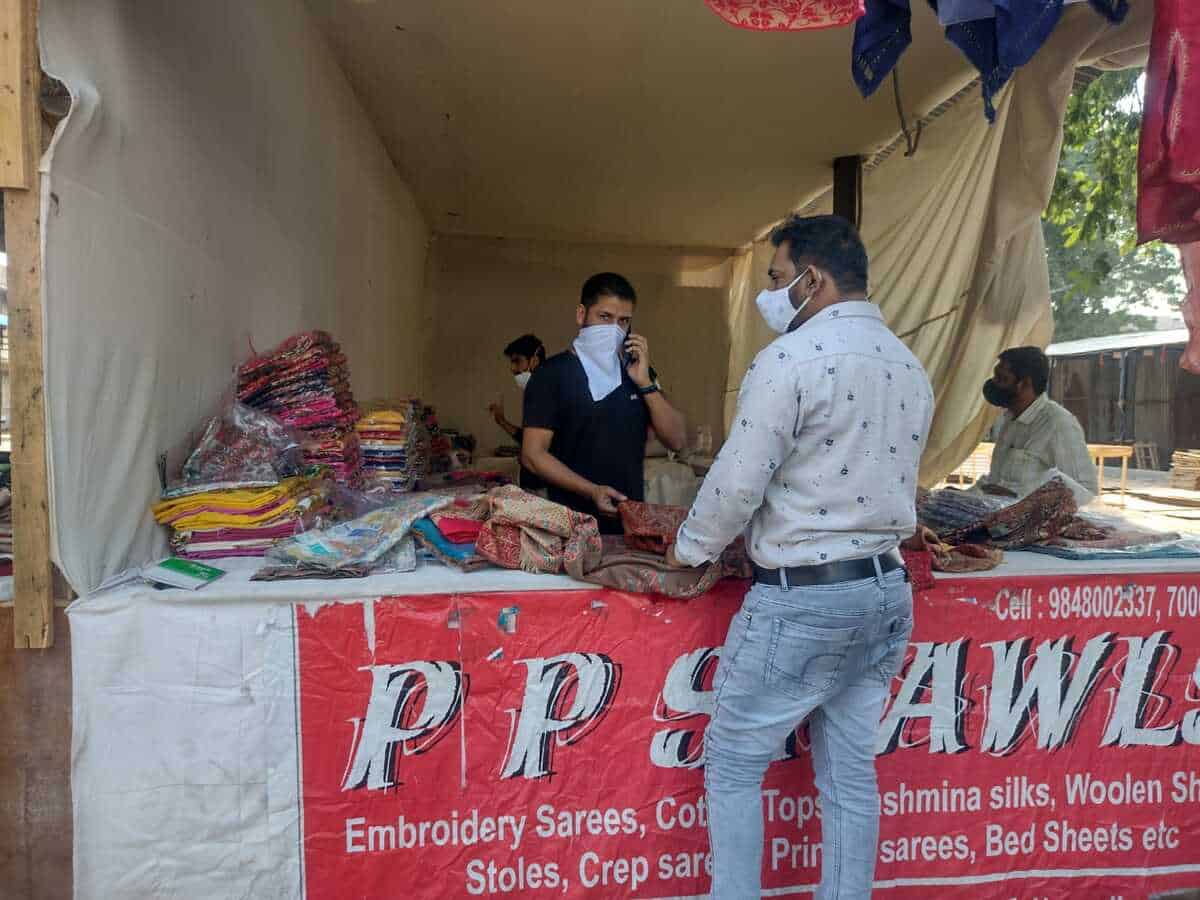
Hyderabad: “90 percent Kashmiri traders have gone back home from Numaish exhibition,” says Mushtaq Hussain, one of the few businessmen from Kashmir who has stayed back in the city.
Hussain came to Hyderabad from the Kupwara district of Kashmir in the hope of selling shawls, kurtas and sweaters unique to his region. But with the Telangana government deciding to cancel the Exhibition, there is little hope for the traders who were already afflicted with poverty and COVID-19 induced loss.
“Mera 25 lakh ka nuksaan hone waala hain kyunki main karz nahi chuka sakta. (I am going to suffer a loss of Rs 25 lakh because I will not be able to repay my debts),” says Hussain. As per his account, everything was going as per plan until January 2 when the state government abruptly decided to put a cap on the exhibition. What was then a tentative decision, now has seemingly become permanent, thus rendering the traders, especially those from Kashmir helpless.
The Exhibition society has returned to Hussain the Rs 1 lakh he paid for stall rent and the GST amount of Rs 18,000. However, the refund will in no way make up for the loss because Hussain had spent significant money on transporting his goods aside from spending on his own travel as well as lodging in the city.
“Abhi Exhibition ki galti nai hain madam, unka bhi loss hi ho raha hain, (It is not the Exhibition society’s fault. Even they are dealing with losses)” he further says.
Gowhar Ahmed Wani, a dry fruit trader from Kashmir, narrates similar problems. “We are not thinking of profit. We are just trying to escape the loss by selling the dry fruits to wholesale markets like Begum Bazaar in the city,” he says.
Gowhar states that his business is not likely to run in Kashmir currently and hence he pinned all his hopes on the Exhibition. “The chief customers in Kashmir would ideally be tourists from across the world. But with snow coating Kashmir in the months of December and January, tourists are not likely to flock. Further, with the COVID-19 pandemic, tourism has come to a halt anyway,” he adds.
Sale outside the Exhibition Grounds:
In a desperate attempt to keep his business running, Mushtaq Hussain has shifted some of his parcels outside the Exhibition grounds. “Few women flock around the packages to make their purchase because I send my shop boys there. However, this move is also not aiding me in profit.” he says.
Unlike Hussain, Gowhar Wani is unwilling to sell his produce on the road. “Abhi kharab ho sakta. Galat cheez nai bechsakte nai logon ko,” he sincerely remarks.
The traders from Kashmir have been struggling since the outbreak of COVID-19 pandemic. When asked if the civil society in Hyderabad has aided them in anyway, the traders informed this reporter that there hasn’t been sufficient help.
Entry of women restricted:
To add to their woes, women have been prevented from entering the Exhibition. When this reporter (a female) tried to enter the Exhibition, she was restricted. The guard at the gate stated that only women aren’t allowed inside the Exhibition but men could proceed if they so wished. When Siasat.com contacted an official from the Exhibition society, they stated that the Exhibition is already shut and as such women (who are the chief customers) cannot be allowed to access the few stalls which are still yet to shut.
As another Kashmiri trader requesting anonymity remarked, “If the entire city is open, malls are open why are they shutting the exhibition alone? It feels unfair and puts a heavy strain on us.”
The shutting of Numaish in 2022 is yet another instance of how the pandemic has gravely impacted small scale businesses.
(Call for help: If anyone wishes to help the subjects of this article, they can place orders to purchase Kashmiri clothes from Mustaq Hussain on 7006918247 and dry fruits from Gowhar Ahmed Wani on 9419025235 or 7006905719)

